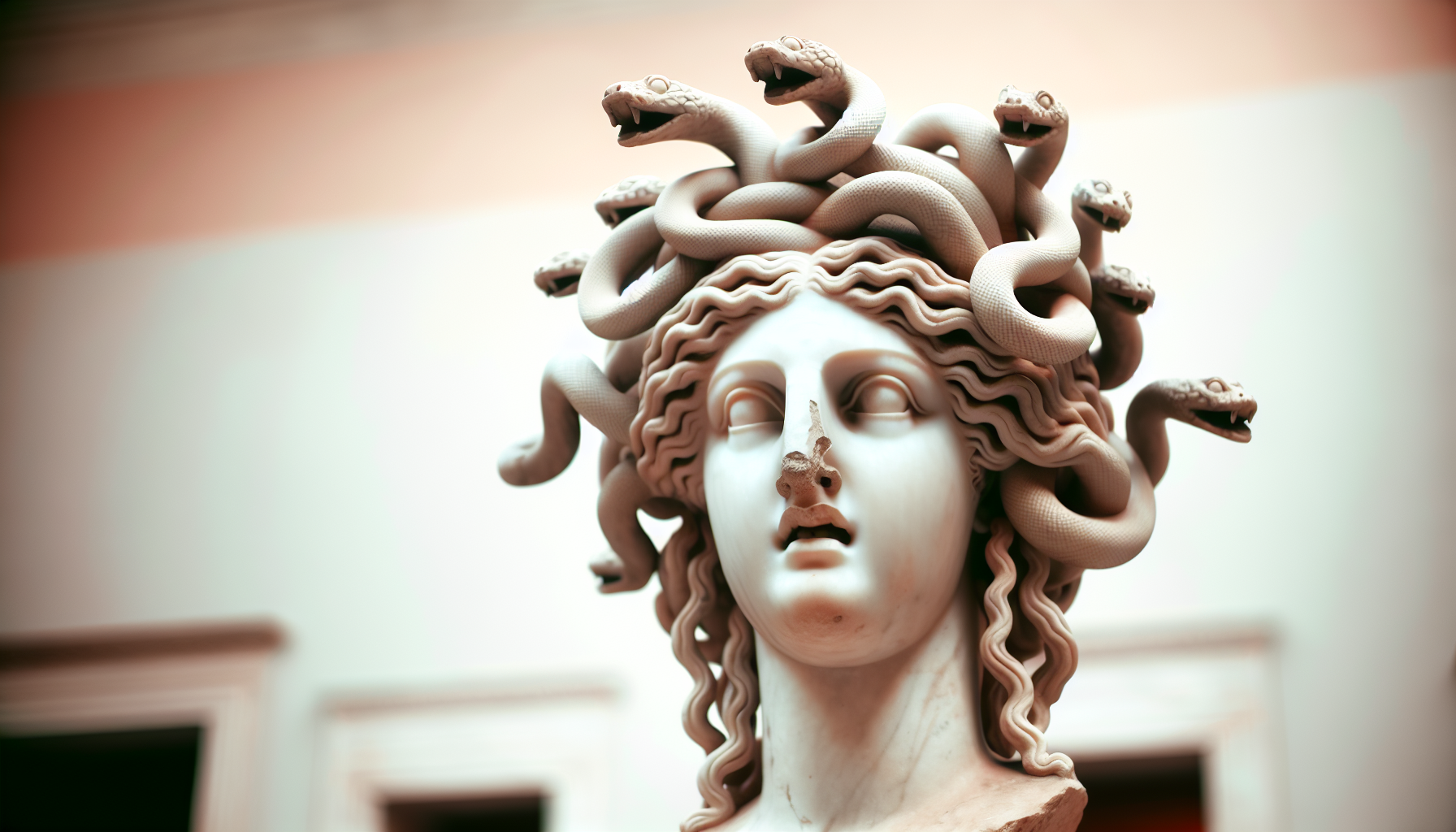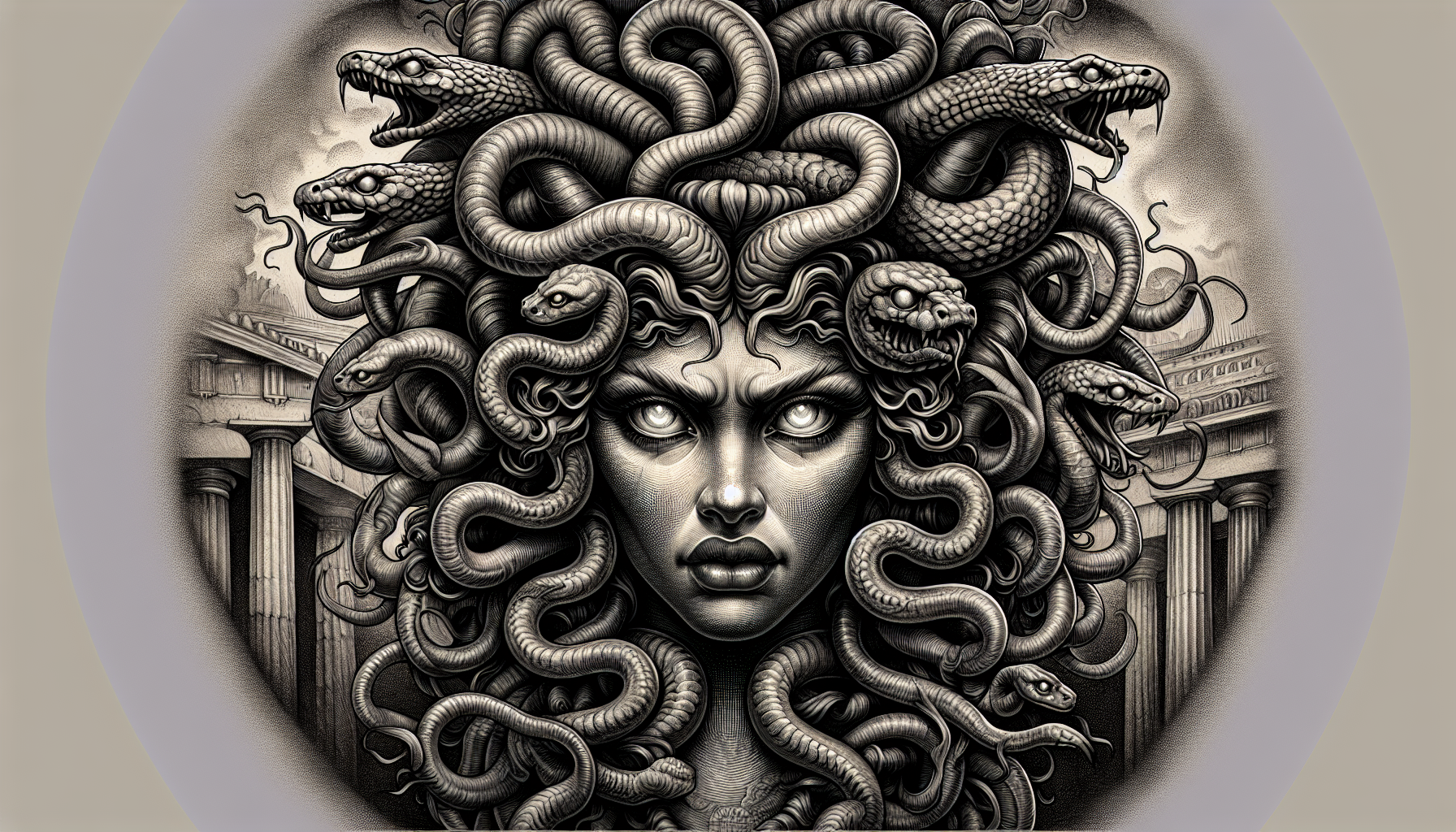As we explore body art, there is an iconic symbol that carries a long tradition and meaning in tattoo art: Medusa. This ancient Greek mythology character with snake hair is a favorite among tattoo lovers, representing such an interesting story of change, strength, and guardian. The meaning behind the Medusa tattoo is deeply connected to these themes, thus making it an intriguing design choice with such power for many newcomers.
Key Takeaways
Medusa thus symbolizes the female potential and transformation.
This mythical creature is popular as a tattoo for its significant cultural meaning and aesthetic, and each tattoo is a representation of how the wearer relates to the myth.
Aftercare and consistent maintenance are key to keeping your tattoo vibrant in the long run.
Unveiling the Medusa Myth

One of the Gorgon sisters, known in ancient Greek mythology for their horrifying countenance, Medusa is a personification of evil and monstrous femininity in this format. Based on the ancient lore of the Medusa myth, the story is a tale of beauty, betrayal, and transformation. Once a fair maiden leading an average life, Medusa’s defining trait came as a byproduct of a curse: her hair, now a writhing mass of venomous snakes. This mortal Medusa was one of the three sister Gorgon figures who play a prominent role in Greek mythology, and whose tragic tale remains a popular source of inspiration.
Medusa’s transformation included both the corporeal and the symbolic. Once just a woman, she became a symbol of power and protection, her image burned into the minds of all who chose to look on her.
The Curse of Athena: From Beauty to Beast
Medusa’s transformation began with a horrific assault. Poseidon, the god of the sea, raped her in the very sacred precinct of the temple of Athena. This sin provoked the fury of Athena, the chaste goddess of wisdom and war, in her own temple, the Athens Temple. Shunning Poseidon’s punishment, Athena took her wrath out on the unfortunate Medusa, transforming her beautiful locks into a nest of poisonous serpents and imbuing her with the terrifying ability to turn any living thing into stone with a single glance. And so the punished Medusa, a tragedy of Greek myth.
The story of Medusa’s transformation is a compelling one, rife with symbolism. It’s a tale of punishment and power, of violation and vengeance. In the world of tattoo artistry, these motifs are powerfully reflected, making the Medusa tattoo a symbol of female empowerment and strength.
Medusa: The Power to Protect Against Threats
Medusa’s severed gorgon head, the “gorgoneion,” was also of great cultural significance beyond its monstrous image. Among the ancient women, it was thought of as one of the protective symbols that could avert evil and provide protection from other men. The gorgoneion was used as a decorative element, as an amulet, as well as an apotropaic device, that is, one that kept away evil.
In the realm of tattoos, the head of Medusa, a protective sign, still holds this ancient meaning. This is because it is associated with apotropaic power—its use is believed to avert evil or negative energy and protect the user. Moreover, it represents revolt, strength, and gain, so it becomes a sign of protection and power within the narrative of body ink.
The Intricacies of Medusa Tattoo Art

A classic Medusa tattoo is far more than just an aesthetic preference; it is a tattoo with a deeply personal meaning. Evolving from a simple symbolic representation to an intricate narrative medallion on the sleeve, the complex design often depicts Medusa’s head in monochrome alongside her slithering hair, suggesting a journey of self-discovery and transformation. These tattoos provide a canvas for individual expression, mirroring the unique interpretation of the wearer’s understanding of the Medusa myth.
Medusa tattoos come in a variety of styles, although most continue to stick with a black and white palette. Due to the feeling of strength that the image can evoke, some artists add color, which in turn brings depth and dimension to the image. The design choice varies widely, reflecting both the wearer’s individual style and the artist’s interpretation of the myth. The range of creative choices extends from traditional American tattoos to contemporary interpretations representing strength and power, the variety only as rich and complex as the Medusa myth herself.
Snake Hair and Stony Stare
You might be looking for that snake hair and that stony stare, which are also some of the fundamental elements that make a Medusa tattoo easy to identify. These twisted locks symbolize metamorphosis, new beginnings, and inner strength, but also a cautionary tale against hubris and pride. Her gaze has the power to transform anyone into stone, symbolizing the era and the power dynamics between the gods and mortals.
Many styles of skin art render Medusa’s icy stare. Some include abstract trappings such as snakes or Greek patterns, while others attempt to recreate the realism of her mysterious gaze, thus showing just how many ways Medusa’s powerful presence can be embodied.
Picking the tattoo artist: The artist’s touch
The Medusa myth is rich with symbolism and artistry, and the right artist can truly bring it to life on your skin, depicting her strength and beauty in detail. An extensive knowledge of Greek mythology is essential, not simply for the artist to do justice to the legacy and convey the meaning that comes with Medusa.
When choosing an artist for your Medusa tattoo, you’ll need to consider their:
knowledge of Greek folklore
artistic ability
meticulousness
technical proficiency
good communication skills
Taking these variables into account, those who decide to get a Medusa tattoo will be led to an artist who will be able to help create a tattoo that is not only stunning but also personal to them and the quality of the symbolism they desire to carry on their body.
Medusa Tattoos: Emblems of Female Empowerment

It’s more than just an image; the Medusa tattoo is a powerful symbol. This is a symbol of female power, freedom, and transformation for many women. The Medusa myth has become a source of power and strength after trauma, inspiring resilience and survival.
These tattoos are viewed as emblems of personal transformation, representing the wearer’s journey of self-discovery. They resonate with the wearer’s inherent strength and ability to overcome challenges, making the Medusa tattoo a strong symbol of female empowerment.
Taking Back the Power: Medusa and Feminism
This is why the Medusa story resonates so strongly with feminists. It is versed in the struggle for women’s rights and depicts formidable women fighting the patriarchal society. It serves as a symbol of:
female monstrosity
power
highlighting how oppressive dynamic patriarchal societies are
underscoring that it was paramount for women to take back control of their lives.”
If Medusa had been a peace-loving mother, she would have been beheaded for her peace-loving mothering or some other form of feminine triumph, but Medusa is a conqueror and a feminist crusader; the story of Medusa is a cautionary tale of both powerlessness and female decapitation, or the killing of the conquerors. As the Roman writer Ovid puts it, it reinforces the importance of women reclaiming their agency and standing up to oppression.
It is in inking and the mark of ink modeling.
For many individuals, a Medusa tattoo may also be a deeply personal signifier, representing their journey of self-transformation and finding their own strength. A reference to the wearer’s resilience, it represents their strength in surviving traumas. So in this context, what does a Medusa tattoo mean? It is a symbol of strength and the power to overcome obstacles.
For survivors of sexual assault and other sexual violence, your Medusa tattoo has a powerful message of strength and survival. It’s a testament to their strength, how they rise above their pasts, and the journey to find themselves.
Cultural Significance and Popularity of Medusa Tattoos

Medusa tattoos are popular and highly valued culturally. Jinn cats are viewed as a protective talisman—keeping away evil deities and bad energy. The strong symbolism, bold aesthetic, and embodiment of female strength and resilience are proving to be the main reasons for the increase in popularity of the Medusa tattoo.
A Symbol Across Cultures
Medusa is symbolic in every culture. In certain cultures, she is seen as a terrifying figure representing risk and lethal seduction, and in others she is celebrated as a symbol of femininity, knowledge, and wisdom. After all, what with her being a symbol of power and metamorphosis for both Greek mythology and elsewhere, she was bound to be an archetype appearing in different belief systems.
The way people are drawn to the story of Medusa and the way her image has endured throughout history means that she’s an iconic figure in art, literature, and pop culture. Her distinct attributes, like her hair of snakes and power to petrify people, make her a fascinating subject that resonates with people, allowing her to retain relevance throughout different backgrounds.
Why Get a Medusa Tattoo?
One word you should associate with Medusa tattoos, people say, is symbolism. Women who wear these tattoos said their meanings are deep, signifying female empowerment, personal growth, and protection. They remind the wearer of their power, their strength in the face of adversity, and their journey to becoming the best version of themselves supported by their new favorite accessory.
Getting a Medusa tattoo is a personal choice: it shares the meaning of the myth that resonates with the wearer, their experience, and their journey. No matter what draws you to the Medusa tattoo, be it the aesthetics of the design, the mythology behind it, or the symbolism, it’s a choice that can say a lot!!
Caring for Your Medusa Tattoo

Due to the fact that you’ve just received your very own Medusa tattoo, care is very important to follow in order to keep it bright and allow it to heal well. In the immediate period after a tattoo, following the aftercare steps recommended by your tattoo artist is essential. This includes washing and moisturizing the tattoo once or twice daily.
H2Ocean’s Piercing Aftercare Spray and NeilMed Wound Wash Spray are the recommended aftercare products for a Medusa tattoo. This helps promote proper healing, so the product needs to be applied twice a day. Your Medusa tattoo can heal perfectly, with time, care, and attention, keeping its beautiful details and rich symbolism over the years.
Healing Process and Aftercare
A Medusa tattoo typically takes 6-12 weeks to heal, depending on the individual’s immunity and overall health, as well as adherence to post-procedure aftercare instructions. Cleaning during this time is crucial. Gently wash the tattoo with scent-free soap and water, and then dry and apply a gentle moisturizer, such as Tatloc Tattoo Balm.
Following aftercare guidelines is essential to ensure a smooth healing process and keep your Medusa tattoo shining. This means avoiding sunlight to reduce fading and considering touch-ups for your tattoo to maintain original appearances.
How to Preserve the Freshness of Your Tattoo
Regular maintenance and care are required to ensure that your Medusa tattoo stays fresh. Here are some pointers:
Moisturize it with tattoo lotion
Protect it from being exposed to direct sunlight
Drink plenty of water, exercise and eat a healthy diet
Lightly cleanse the tattoo site and do not pick at or scratch it during healing.
By following these tips, you can help make sure that your Medusa tattoo will remain fresh and gorgeous for years to come!
As it continues to heal, you may see the tattoo lose some of its initial vibrance. This is normal. As the skin sloughs off on its own, the pigmentations of the tattoo reveal themselves. When the ink starts to get dull, you will want to get a touch-up every now and then, but for the most part, a Medusa tattoo should hold its value.
Summary
The world of tattoo art is a space filled with myriad designs, each telling its unique story; however, there is one tattoo that speaks to the transformation of the feminine, the strength of spirit, and the resilience of an individual, and that is the Medusa tattoo.
Originating from ancient Greek mythology yet refracted through contemporary prisms, it is a potent symbol of female empowerment. Whether it’s the powerful visual of the Medusa, the lore or rich history, or the symbolism of transformation and growth, a Medusa tattoo serves as a reflection of change in one’s life. Ultimately, each Medusa tattoo narrates a unique tale, reflecting the skin it graces.
Frequently Asked Questions
What does Medusa symbolize?
Similar to the evil eye, Medusa serves as a protective sculpture, shielding people, animals, and even nature itself from any negative energies.
Medusa tattoo meaning girls What does it mean?
Many women who were sexually assaulted have had the Medusa tattoo inked on their bodies as a symbol of empowerment to reclaim their identity and move away from the notion of being bad or cursed.
Who Can Get a Medusa Tattoo?
Anyone can get a Medusa tattoo—yes, anyone—but the design is a symbol of surviving sexual assault or abuse.
Why was Medusa cursed?
Medusa had also been cursed by Athena for breaking her vow of celibacy and had been raped by the sea god Poseidon in Athena’s temple, whereby she was transformed into a monster. An insult to beauty itself, this defilement of the temple of a virgin goddess so enraged Athena that she cursed Medusa to become the hideous creature we know.
How do I choose a tattoo artist for a Medusa tattoo?
Key factors to consider when selecting a tattoo artist for a Medusa tattoo include their familiarity with Greek mythology, portfolio quality, technical skills, and communication abilities. These points are very important to make sure that you have a tattoo that is not only accurate but also well executed.





